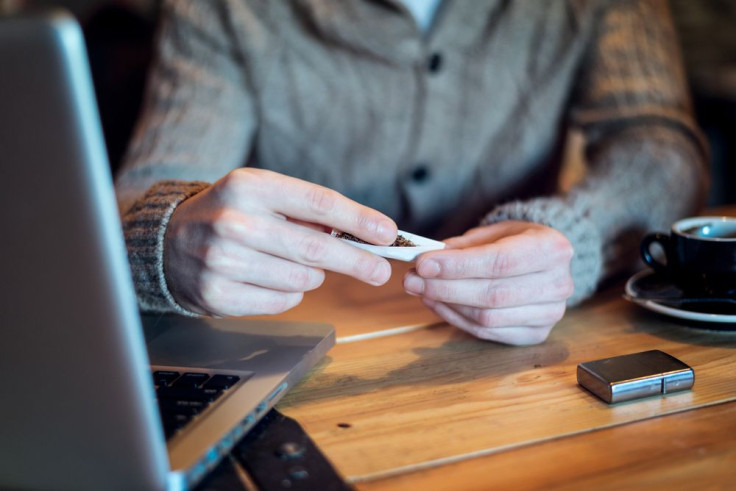Drinking Coffee And Smoking Pot: Caffeine Dosage Impacts Marijuana's Effects

Millions of people consume caffeine every day, especially in the morning and as a pick-me-up in the afternoon. Whether you drink one cup of coffee or five, however, your caffeine buzz could influence the level of another buzz — marijuana. According to a recent study published in The Journal of Neuroscience, drinking large amounts of coffee may enhance your high and increase the likelihood of marijuana addiction.
Marijuana and caffeine are America’s favorite drugs. In the U.S., 85 percent of the population consumes at least one caffeinated beverage per day, according to a 2014 study published in the journal Food and Chemical Toxicology. Meanwhile, more than 14 million Americans use marijuana regularly despite laws against its use. Both marijuana and caffeine have a pharmacological relationship that can take a toll on the body, for better or for worse.
Neuroscientists from the Integrative Neurobiology Section of the National Institute on Drug Abuse, a branch of the National Institutes of Health, sought to observe the effect of MSX-3 — an adenosine A2A receptor antagonist — on marijuana, and why humans find these two drugs so enjoyable. MSX-3 produces similar actions of caffeine on the brain. The neuroscientists tested monkeys who were addicted to delta-9 tetrahydrocannabinol (THC), which is the active ingredient in marijuana. The monkeys were able to freely self-administer as much or as little of THC as they wanted.
The findings revealed the neurotransmitter receptor in the brain blocked by the caffeine-like substance is offset by the chemicals related to THC found in marijuana. Monkeys who were given a large dose of MSX-3 used in the study chose to take more THC than when given a lower dose. Researchers concluded the monkeys were more inclined to self-administer additional amounts of THC to make up for the drug's effects on the brain.
In the brain, caffeine blocks the neurotransmitter receptor for the chemical adenosine. The neuroscientists found blocking the presynaptic adenosine receptors is what led the monkeys to stop self-administering THC. By comparison, blocking the post-synaptic adenosine receptors led to the monkeys increasing their self-administration of THC.
“Apparently, high doses of coffee makes us feel so good because it is able to tap into virtually every reward system our brain has evolved. Hidden within that hot black silken elixir is a chemical that has taken over your brain by mimicking the actions of marijuana,” wrote Dr. Gary Wenk, a professor of Psychology & Neuroscience & Molecular Virology, Immunology and Medical Genetics at the Ohio State University Medical Center, who was not involved in the study.
When it comes to coffee and its effect on marijuana, caffeine can both help and diminish its high. Overall, higher doses of caffeine-like drug lead to higher intake of marijuana, whereas lower doses lead to less intake. However, the researchers caution it’s too early to say whether the same effect can occur in humans as it did for the monkeys in the study.
A similar study published in the journal Molecular Nutrition & Food Research explored the possibilities that coffee’s addictive properties also involve the brain’s marijuana-like neurotransmitter. Basically, when you first start drinking coffee you get the arousal, and then as you build a tolerance, you start to need more of it in order to reach the same level of arousal and vigilance. Caffeine begins to stimulate the brain’s endogenous marijuana neurotransmitter system. This is because coffee acts on dopamine in the brain.
Wenk believes the studies that are surfacing “provide insight into a potential danger of caffeine to increase the addictive and negative cognitive effects of marijuana.”
In the recent study, selectively blocking the presynaptic A2A receptors could provide a new approach to treating marijuana addiction. Although it has yet to quantify how much a “small” amount of coffee is for humans to combat marijuana addiction.
Marijuana addiction is rare, but it can happen to regular smokers. A study by the National Institute on Drug Abuse found about nine percent of people who use marijuana will become abusers. These studies help scientists get a step closer to understanding the effects of substances like caffeine and marijuana on the human brain.
Editor’s Note: A previous version of this article listed caffeine as the drug adminstered to the monkeys in the experiment. MSX-3, not caffeine, is the correct drug.
Sources:
Ferre S, Goldberg SR, Justinova Z et al. Differential Effects of Presynaptic versus Postsynaptic Adenosine A2A Receptor Blockade on Δ9-Tetrahydrocannabinol (THC) Self-Administration in Squirrel Monkeys. The Journal of Neuroscience. 2014.
Bernardi G, Centonze D, De Chiara V et al. Effects of caffeine on striatal neurotransmission: Focus on cannabinoid CB1 receptors. Molecular Nutrition & Food Research. 2010.
Anthony JC, Kessler RC, Warner LA. Comparative epidemiology of dependence on tobacco, alcohol, controlled substances, and inhalants: Basic findings from the National Comorbidity Survey. Experimental and Clinical Psychopharmacology. 1994.



























